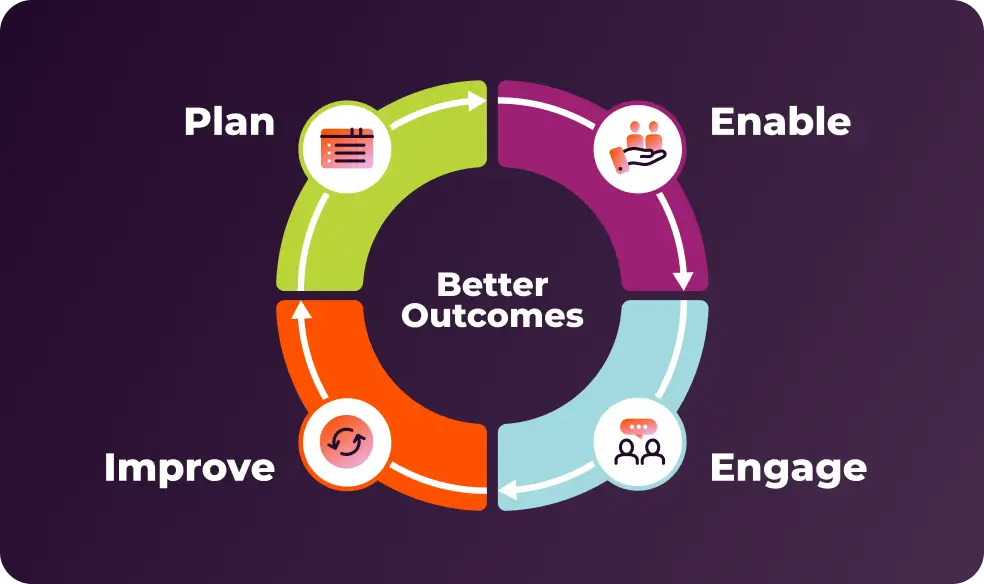As sales organisations become more process driven and strategic, sales operations have taken on a new level of importance. The sales operations role was invented at Xerox in the 1970s and described as a position that “takes care of all the things that no one wants to do, but needs to happen to make a great sales force.”
Fast forward fifty years, and there are now thousands of sales operations professionals in the United States alone. The role only continues to grow, but what does the modern-day role of sales operations look like for today’s go-to-market (GTM) organisations?
What is sales operations?
Sales operations support the greater sales team so they can successfully drive revenue. The primary goal of sales operations is to streamline and improve sales processes so sellers can be as effective and efficient as possible. This involves:
- Sales planning and strategy implementation
- Sales analytics and reporting
- Sales process automation
- Sales forecasting and pipeline management
- Sales tool management and administration
Sales operations vs. sales enablement
Sales operations and sales enablement are closely related, but serve distinct roles within GTM organisations. And, while they share similar goals, there are key differences. Let’s break them down.
| Sales Operations | Sales Enablement |
|---|---|
| Focuses on strategic and tactical aspects for effective sales management | Focuses on empowering sellers with skills, knowledge and resources |
| Ensures the sales organisation runs smoothly and efficiently | Ensures marketing and sales teams are aligned |
| Manages the sales tech stack and reports performance and key business outcomes | Helps with content creation, discovery, analytics, sales readiness and more |
Sales operations description
Sales ops focuses on the strategic and tactical aspects needed for effective sales management. The sales operations function is primarily a behind-the-scenes role that implements the necessary tools, resources and processes sales teams need to hit their goals.
Sales enablement definition
Sales enablement focuses on empowering sellers with the skills, knowledge and resources they need to succeed. This is a more hands-on role that improves the productivity and performance of sellers by providing training, tools and enablement resources tailored to specific sales plays and company objectives.
Did you know?
Organisations with a strong sales ops team experience higher productivity and greater revenue?
Why is sales ops important?
The world of sales is quickly evolving, and teams need to make smart investments in order to remain competitive. Many organisations are also trying to do more with less in today’s economic climate. At the same time, buyers have changed the way they interact with sellers. All of these scenarios mean that GTM teams need to make strategic business decisions that will lead to as much success as possible. Sales ops makes this possible by supporting sales leaders and sellers alike with the strategies and tools they need to be effective. In fact, a study by McKinsey found that organisations with a strong sales operations team experience higher productivity and greater revenue than those without one.
What does a sales operations team do?
Now that you have a better understanding of what exactly sales operations does and why it’s so important, let’s take a closer look at specific responsibilities and tasks.
Drive sales strategy
Sales operations teams work closely with sales leadership to develop sales plans, set goals and create strategies that enable sellers to hit targets. This includes:
- Cross-functional collaboration: Sales ops acts as an advocate and partner for sales teams. They work with product, marketing and leadership teams to create alignment across the GTM organisation.
- Analysing sales metrics: Sales data is not only important for compensation and forecasting. It’s also critical for deciding how to adjust the sales organisation and GTM model. Sales operations can help spot trends and provide recommendations on how to adjust the sales strategy.
- Forecasting: Using data and predictive models, sales operations take an active role in this strategic function by making accurate predictions of what will close, where there’s pipeline opportunity and which deals are at risk of losing.
Organise sales teams
Sales operations also play a key role in recommending the organisation and responsibilities of the greater sales team. This includes:
- Hiring: Who makes it through the doors and onto your team will dramatically affect the performance of your organisation. It can demotivate your top-performers or it can lead to an all-star team. Sales operations help establish hiring practices and criteria to ensure the right sellers join the team.
- Territories: The allocation of territories – by geo, zip code, vertical and more – can have a major impact on success. Sales operations can balance territories for fairness and maximum ‘exploitation’ of opportunities.
- Compensation: This one is actually mislabelled. A more complete approach is to look at ‘incentivisation’. That is, how monetary rewards, gifts, training, career progression, recognition and other tools can encourage positive actions that drive revenue. Sales operations often manages these programmes and is generally involved in balancing pure compensation versus industry benchmarks.
Sales Operations and Salestech Report
Drive team efficiency and execution
Sellers only have so much time in their day, and Gartner found that they only spend 18% of it selling. Therefore, any amount of time that you can give back to them to focus on core selling activities is going to pay large dividends. Sales operations can have a major impact here by implementing tools and processes that automate manual processes, remove barriers and streamline processes. This includes:
- Transaction processing: Friction in the sales process can dramatically slow any deal. Sales operations measures where bottlenecks occur in the selling process and make necessary improvements.
- CRM administration: Sales ops often oversees the administration and management of the team’s CRM. They ensure accurate data entry, set up tool integrations, create reports and dashboards and report on activity.
- Managing the tech stack: There are a number of tools that make sales teams more effective. From data quality and appending to email management tools, sales operations should pioneer the discovery and adoption of the best sales productivity tools possible.
Sales operations rightly deserves a strategic seat in every GTM organisation. While not all of these responsibilities will apply to your team, it’s important to evaluate them and identify the best areas for your team to focus on.
Never stop growing.
Boost sales success with Seismic
Best-in-class companies are eager to jump in and use the best tools and resources to help their organisation create a winning sales enablement strategy. Hungry for more knowledge about sales enablement and how it can help your organisation operate efficiently? Get a demo and we’ll show you how!


